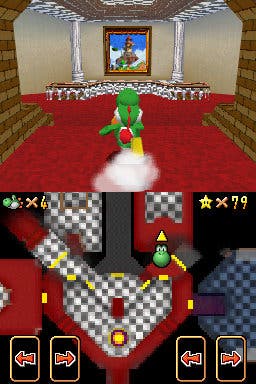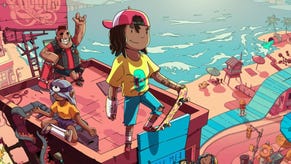Saturday Soapbox: Bring On The Next Generation
Before the games industry really loses it mojo.
You may have noticed that my splendid and lovely colleagues Oli Welsh and Martin Robinson have recently become embroiled in what may very well be the most polite argument in the history of the internet, debating whether or not 2011 has been a vintage year for gaming.
Put simply, their arguments are that Oli struggles to name a single game released in 2011 that is truly new, whereas Martin feels that games have become mature enough to experiment and innovate within established frameworks in ways that are both creatively and commercially satisfying. So basically he agrees but he doesn't mind.
We're not the only gamers saying this, of course. Hell, even The Economist is saying it. According to their recent special report, the core games industry "is now an expensive, risky and hit-driven business, so the developers have become deeply conservative, preferring to build on past successes rather than try something new". Like us, they toss about the idea that this may or may not matter.

For what it's worth, I lean more towards Oli's end of this jumped-up pillow-fight. Once upon a time, we would load up games like Doom, Super Mario 64 or Guitar Hero and find ourselves catapulted into a completely new system or way of thinking about interactive entertainment, whereas everything these days feels like a variation on a theme, especially this year.
Look at this year's line-up of triple-A games, for example (and for the sake of furthering my own argument let's loosely define "triple-A" as "games that might reasonably be expected to compete for the number one spot in the weekly UK charts"). Within that 50-or-so strong subset of 2011 releases, the only new, non-sequel releases were Rage, Dead Island, Shadows of the Damned, Brink, Homefront and Bulletstorm. So that's a first-person shooter, a zombie game, a zombie game, a first-person shooter, a first-person shooter and a first-person shooter. Well done everyone!
But hey, you can prove anything with statistics (especially if you massage them - I left out the lovely and fairly original L.A. Noire), but what's clear to me about mine colleagues' disagreement is that this is more of an emotional thing. Some of us are enjoying our games fine - I had no trouble rattling off a top 10 list for our Game of the Year voting recently, and have finished more games this year than I did in 2009 or 2010 - but are yearning to rediscover that sense of wonder and excitement that we once associated with our hobby.
So, if you were to cut me in half at the precise point I first got to grips with Katamari Damacy - the first time I became large enough to pick up an object that had previously towered over my ball - and were to try to dissect my sense of wonder and excitement, which was once so commonplace, what would you discover? And what conclusions would you be able to draw about it? Because I don't care about whether this is a vintage year - I just want to know why I'm not connecting with games the same way I used to connect with them.
After much reflection, I think the greatest trigger for those forgotten sensations is probably also the simplest and most obvious one: a heightened sense of interactivity and tactility, or the ability to manipulate things in new and interesting ways. 3D graphics cards revolutionised PC gaming because we could walk amongst real shadows and rake our shotguns across the cobbles like prosthetic limbs. Online gaming did it again because our friends and enemies were no longer restricted to pre-programmed routines. Analogue controls were the same.
This is why most motion controllers are the false prophets of innovation, for my money, because they imply heightened interactivity while actually muddying and slowing your connection to content. And I like my iPhone fine, by the way, but I don't feel more involved there either - as this rant about the future of interaction points out, we're just manipulating pictures under glass. The Nintendo DS is a better future than an iPhone or iPad, because I have greater dexterity wielding a stylus.
So what can I do about this? Well, in the short term the best thing I can think to do about it is to stop gaming on consoles. With the exception of Sony, which ignored the marketing potential of Kinect technology in favour of superior fidelity with Move, and which continues to invest in interactive storytelling with a passion nobody else seems brave enough to embrace, console manufacturers and developers are hoping we'll wait for the next dawn.
I know the idea of a next generation is painful for a lot of companies. At the start of this year, THQ's head of core games Danny Bilson told me that it would be "horrible" to wake up one day soon and discover Microsoft or Sony was hitting the generational reset switch again on console hardware; that Xbox 720 or PlayStation 4 were just over the horizon. But I don't care. Once there's a new console with better hardware, our games will have to start looking better again, but they'll also be able to think in more complex ways, and this will encourage developers to imbue their creations with more of that cherished interactive fidelity.
So what am I going to do about it? I'm going to buy a new PC, because I'm done waiting. It will be my next generation console. It will run Battlefield 3 at top settings so that I can peer into fog rather than trying to see round a mophead of particles. It will allow me to walk down a hill in Skyrim and look at the farm in front of me without having to imagine the textures until it's computationally convenient for them to appear. I won't have PSN or Xbox Live, but I'll have Steam, which will probably do the trick.
So yes, in a sense my argument boils down to: I want better graphics again. Because it's a start, and because being able to enjoy a spectacle in a new way again is probably the closest analogue currently available to me for the sensations I once took for granted.

















-3-31-23-screenshot.png?width=291&height=164&fit=crop&quality=80&format=jpg&auto=webp)



